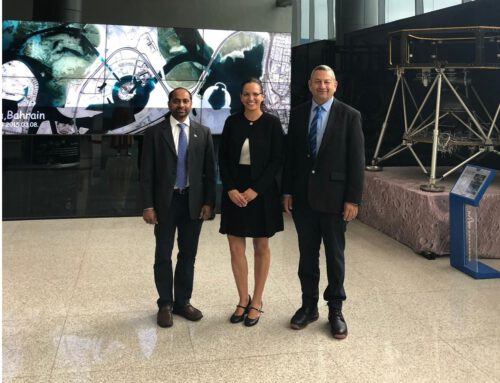Prof. Dan Blumberg, Ben-Gurion University's Vice President for Regional and Industrial Development: "Our ability to observe the Earth from space and quickly analyze complex damage is well used around the world and reduces the damage of disasters such as earthquakes, tsunamis, droughts and more"

The United Nations Office for Outer Space Affairs (UNOOSA) has chosen the Laboratory for Remote Sensing and Planetary Imaging (EPIF) at Ben-Gurion University of the Negev as a partner for the establishment of a regional support office for emergency management in Israel in cooperation with the Israel Space Agency in the Ministry of Science and Technology.
A regional support office for the management of emergency situations is based on data collected from space and is a professional center that brings together the knowledge, experience and capabilities offered by its member countries with the aim of reducing risk situations and emergencies around the world.
The Laboratory for Remote Sensing and Planetary Simulation (EPIF) at Ben-Gurion University of the Negev is responsible for multidisciplinary scientific research collected from satellite data for environmental applications. In general, the promotion and development of remote sensing methods. The laboratory also serves as one of NASA's regional laboratories for planetary simulations and will in fact be the 25th center to join the organization and add expertise in satellite technology to the UN-SPIDER network.
The cooperation between the United Nations Office for Outer Space Affairs, the Israel Space Agency at the Ministry of Science and Technology and the Laboratory for Remote Sensing and Planetary Imaging (EPIF) at Ben-Gurion University of the Negev will be reflected in areas such as: emergency response management, capacity building on space-based technologies for disaster management and dissemination of methods And results from observations of the earth and on it there will be faith Dr. Shamrit Meman.
Director of the UN Office for Outer Space Affairs, Simonta di Pipo: "I am happy to see that the regional support network for emergency management is constantly growing, adding diverse expertise to its resources and enabling the sharing of knowledge on a global scale. These support offices enhance our work and enable us to help countries leverage space-based technologies to deal with disasters and improve the lives of more people around the world."
Prof. Dan Blumberg, Ben-Gurion University's Vice President for Regional and Industrial Development: "This is an exciting moment in which our long-term scientific knowledge is available for research and makes it possible to support aid efforts when necessary. Our ability to observe the Earth from space and quickly analyze complex damage is well used around the world and reduces the damage caused by disasters such as earthquakes, tsunamis, droughts and more. We wish great success to Dr. Shamrit Meman and the partners on the way in building capacities and training in this important field".
The director of the Israel Space Agency at the Ministry of Science and Technology, Avi Blasberger, welcomed the cooperation signing event and said: "The Israel Space Agency is putting a lot of effort into increasing Israeli government and academic involvement in UNOOSA and COPUOS activities. That is why we support, with great pride, this project in the MOU and wish success to Ben Gurion University and the Remote Sensing Organization in Israel. We expect to see more Israeli ventures supporting UN activities through such collaborations."
Dr. Shamrit Maman from Ben Gurion University of the Negev concluded by saying: "There are collaborations that have already been forged within the center such as an agreement with South Korea as well as combining efforts with Noam Segal, CEO of the Israeli space company Imagest, which will provide satellite support in times of distress and disaster events. We look forward to further collaborations for this important goal."
More of the topic in Hayadan:
